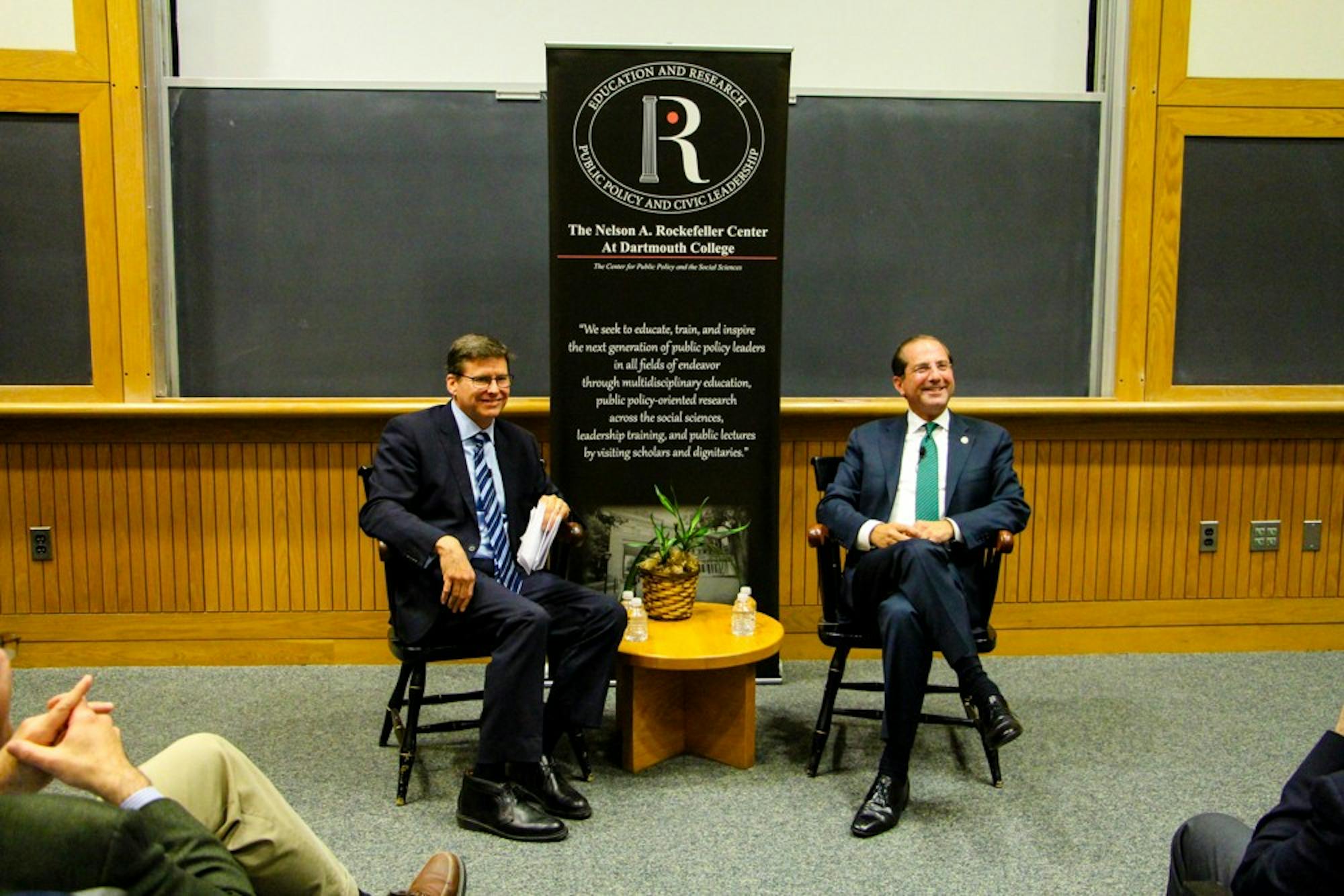On Friday afternoon, an audience of around 100 students and parents gathered to join U.S. Secretary of Health and Human Services Alex Azar ’88 and senior lecturer Charlie Wheelan ’88 for a “fireside chat” in the Rockefeller Center. Azar discussed his journey from Dartmouth to Washington, D.C. and his work in the HHS department. He also answered written questions from the audience about religious protections for healthcare providers and the separation of migrant families who crossed the U.S.-Mexico border.
Wheelan started the discussion by reflecting on their shared time as Dartmouth students. He also mentioned their fellow classmate, New York senator and Democratic presidential candidate Kirsten Gillibrand ’88, who used the name Tina Rutnik as a student.
“Did you think you would be Secretary of Health and Human Services, Tina would be running for president and I would write a lot of books with ‘naked’ in the title?” Wheelan said, referencing his series of books on economics.
Azar described how he attended Yale Law School after graduating from Dartmouth, then interned and clerked throughout Washington. He talked about his transitions between the private and public sector and his initial work with the HHS department as general counsel in 2001. After serving as the president of Lilly USA, the largest division of pharmaceutical giant Eli Lilly and Company, he returned as HHS Secretary in January 2018.
“I have an enormous department,” Azar said. “My budget is $1.3 trillion a year. If we were a country, we would be the fifth largest country on earth.”
Azar said that his four main goals after being confirmed were to reduce drug prices, “turn around” the opioid crisis, create more insurance options in the private market place and add “value” to the healthcare system.
On the topic of reducing prescription drug prices, Wheelan asked how Azar’s experience working for a pharmaceutical company has influenced his tenure as HHS secretary, and Azar cited his experience with Eli Lilly as helpful for the job.
On his goal to end the opioid crisis, Azar outlined the rise of the opioid epidemic and how he hopes to solve it. He noted that one of the main factors that has led to the epidemic is addiction stemming from legal painkiller prescriptions. Azar proposed the use of “medication-assisted treatment,” which helps users recover from their addictions.
“Opioid addiction is a medical condition, not a moral failure,” Azar said. “If there’s one part of Washington that is functioning, it is actually dealing with the opioid crisis.”
Azar also discussed how he wants to “add value” to the healthcare system by moving from paying for procedures to “paying for outcomes and value.” He claimed that medical facilities make more money from sick patients by pushing diagnostics and procedures.
“The only way we’re going to bend the curve in this country is by starting to pay for values and paying for outcomes and results,” Azar said.
To solve this issue, Azar explained a new program that launched a few weeks ago using the “Primary Care First” model, which incentivizes healthcare providers by creating a performance-based payment system, encouraging reduced hospital utilization and producing an overall cost of care, according to Azar.
Finally, Azar discussed creating more affordable options for people in the individual insurance market, which he stated is the “most partisan” issue of all of his goals despite the fact that it is “a fairly small portion of our system.”
Following his talk, Azar answered some questions submitted from the audience and discussed topics, including e-cigarettes and vaping.
“If a minor gets onto e-cigarettes and vaping and becomes addicted to nicotine, that is a catastrophe,” Azar said. “We can’t allow the off-ramp we’re trying to create for combustible tobacco to become an on-ramp for teenagers to nicotine addiction.”
Azar was also asked about the finalized HHS policy that protects “life and conscience” — providing safeguards to healthcare providers who refuse to offer services that they object to on a religious basis, including abortions. Azar responded by saying the previous administration neglected this issue, and the policy is simply an affirmation of existing statutes.
“We do believe we can both respect access for people, as well as protect the rights and conscience of healthcare providers,” Azar said.
On the role of HHS in separating families at the Mexican border, an issue that has grown into a major political controversy in the last year, Azar underscored that HHS is not responsible for separating families but merely providing care for the children who come into their custody.
“Our number one mission with them in addition to keeping them safe and secure while they’re with us is to have them to not be with us,” Azar said. “We don’t separate kids from parents. We get kids.”
Azar has faced some scrutiny, however, for the responsibility of HHS to keep children safe and healthy. On May 1, HHS announced that a 16-year-old Guatemalan boy died while in federal custody. During the conversation, however, Azar focused on the success of HHS in reuniting many families.
“Kids should be with their family,” Azar said. “They should be with their parents. They should be with their relatives. They shouldn’t be with me. That’s what we work to do as safely as we can.”
Azar was also asked a question from an impromptu student as he was leaving the room. Khari Jarrett Th ’21 asked how Azar was planning to lower drug prices when he increased drug prices during his tenure as President of Lilly USA.
“We’re actually changing that so every company will have the incentive to lower prices,” Azar said. “I’m committed to it. The President is committed to it.”
Jarrett interrupted Azar with the final word.
“I hope your future is different than your past,” Jarrett said.
In an interview following the event, College President Phil Hanlon expressed his appreciation for Azar’s visit.
“Secretary Azar has huge responsibilities,” Hanlon said. “That’s what we want from Dartmouth alums — that they go out and lead lives in leadership and impact.”



